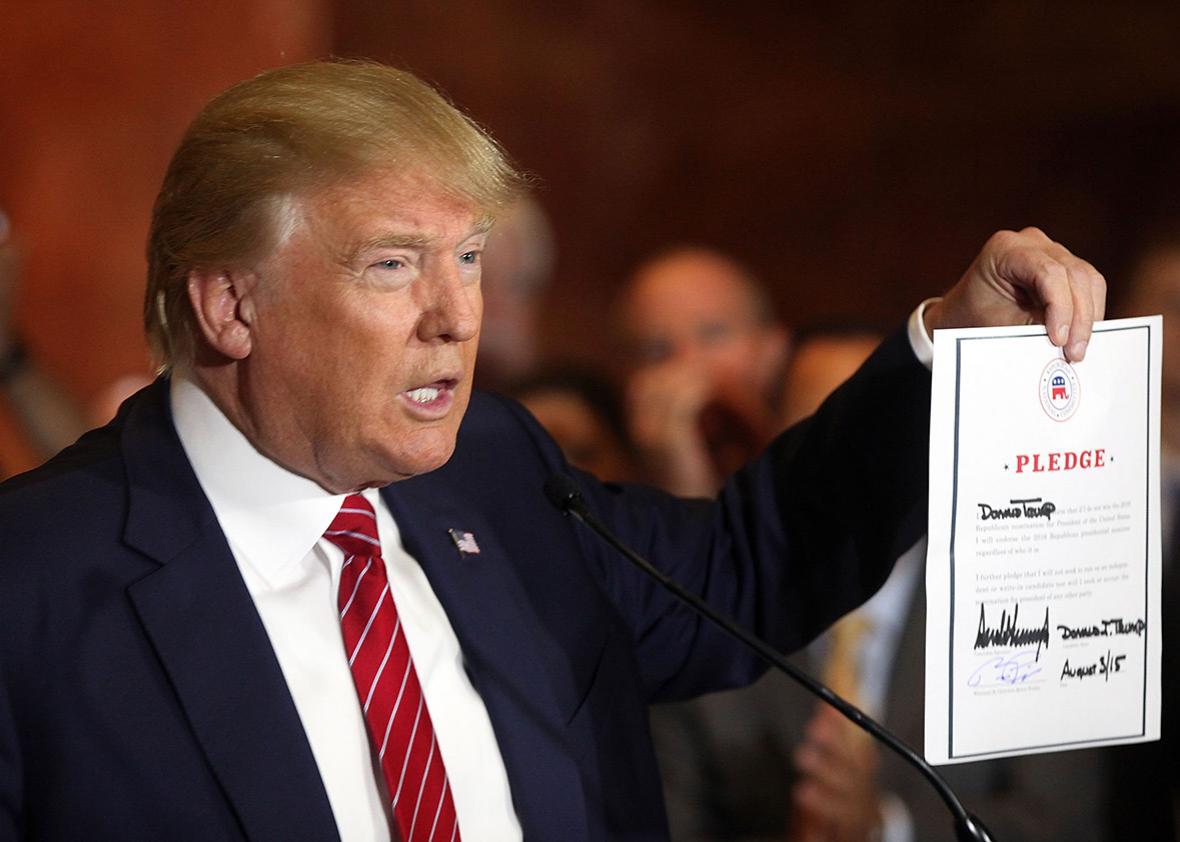Another day brings another poll with Donald Trump in the lead. According to a new Monmouth University poll of Republicans nationwide released Thursday, the real estate mogul leads the pack with 30 percent of the vote. His next closest competitor, retired neurosurgeon Ben Carson, takes 18 percent. By contrast, the most mainstream and viable candidates—Jeb Bush, Sen. Marco Rubio, and Govs. Scott Walker, John Kasich, and Chris Christie—take 8 percent, 5 percent, 3 percent, 2 percent, and 2 percent respectively, for a combined total of 20 percent support among the five of them.
In other words, the age of Trump is here, it shows no sign of retreat, and Republican leaders are nervous. If Trump becomes the nominee—still unlikely, for the same reasons it’s difficult for Sen. Bernie Sanders to pull a win in the Democratic primary—he’d be an easy target for Democrats, who could blast him for everything from inexperience and temperament, to his nativist rhetoric and unsubtle racism. But a Trump nomination is so unlikely that it’s not the actual nightmare for the Republican Party. The nightmare is a third-party run, where Trump gets himself on the ballot in all 50 states, and siphons white voters from a GOP that needs white turnout to win national elections.
That nightmare is why, on Wednesday, the Republican National Committee privately circulated a “loyalty pledge” to the party’s presidential candidates. “I [name] affirm that if I do not win the 2016 Republican nomination for president of the United States I will endorse the 2016 Republican presidential nominee regardless of who it is,” reads the pledge. “I further pledge that I will not seek to run as an independent or write-in candidate nor will I seek or accept the nomination for president of any other party.” The obvious hope was that Trump would agree, rule out an independent run, and let Republican leaders breathe easy (or at least, more easily).
On Thursday, Trump obliged. He signed the pledge and held a press conference, where he made a verbal commitment to the Republican Party. “I see no circumstances under which I’d tear up that pledge,” he said, adding later that he’s been “treated well” by Republican National Committee Chairman Reince Priebus and the RNC. He’ll commit to conservative principles, and if he loses, he loses.
On the surface, this is an important victory for Republican leaders. But look carefully, and it’s somewhere between a disaster and a catastrophe. Trump hasn’t just bound himself to the RNC, the RNC has bound itself to Trump and put pressure on other candidates to do the same. Let’s say Rubio wins the primary and becomes the Republican nominee. Thanks to the pledge, he’s linked to Trump, and Democrats can run wild with guilt-by-association. By the end of the campaign, Trump might be the face of the Rubio campaign, as much as the Florida senator himself.
That’s the disaster. The catastrophe is that there’s nothing to hold Trump to the pledge. As soon as it becomes inconvenient, he can break it. And because he’s untethered from the institutions of the Republican Party, Trump has nothing to lose from breaking the pledge. Indeed, anything he gains from signing—the imprimatur of the GOP and commitments from other candidates—is almost irrelevant to his appeal as the “outsider” who understands the world of the “insiders.” The only thing that ties Trump to his word, on this score, is the promise of official “respect.” For a man of Trump’s ego, that’s weak binding.
Consider Ross Perot, whose 1992 run was a challenge to George H.W. Bush, although it didn’t cost him the election. Initially, Perot denied a plan to run. But, on a February episode of Larry King Live, he hedged his refusal. “If voters in all 50 states put me on the ballot—not 48 or 49 states, but all 50—I will agree to run,” he said. Voters came out, and he ran. But by the summer, his campaign was pockmarked by controversy and on the decline. Appearing with Larry King again, he announced his political departure. “I have not gone away,” Perot told King. “But I have concluded that I should not be the candidate.” This lasted for a few short months, at which point, Perot jumped into the race for good. “The volunteers in all 50 states have asked me to run as a candidate for President of the United States,” Perot said in an October speech. “Jim Stockdale, our vice-presidential candidate, and I are honored to accept their request.”
No, Perot didn’t sign a pledge or run in either primary. But that doesn’t make him a different case; the point is that Perot made a promise, and broke it. And why wouldn’t he? He had nothing to lose. On the same score, it’s not hard to imagine a world where Trump loses the primary, but “the voters” still want him to run. What stops Trump from citing imagined “disrespect” and starting a third-party campaign? Nothing. The Republican Party can’t stop him, and it can’t sanction him. The party thinks it has power over him, but it doesn’t.
If anything, the loyalty pledge enhances his platform. He can run his campaign—touting Social Security and condemning illegal immigration—and when he loses the nomination, he’ll have the audience and support he needs to make an independent run. Whether Priebus knows it or not, he’s been played, and it’s going to hurt.
